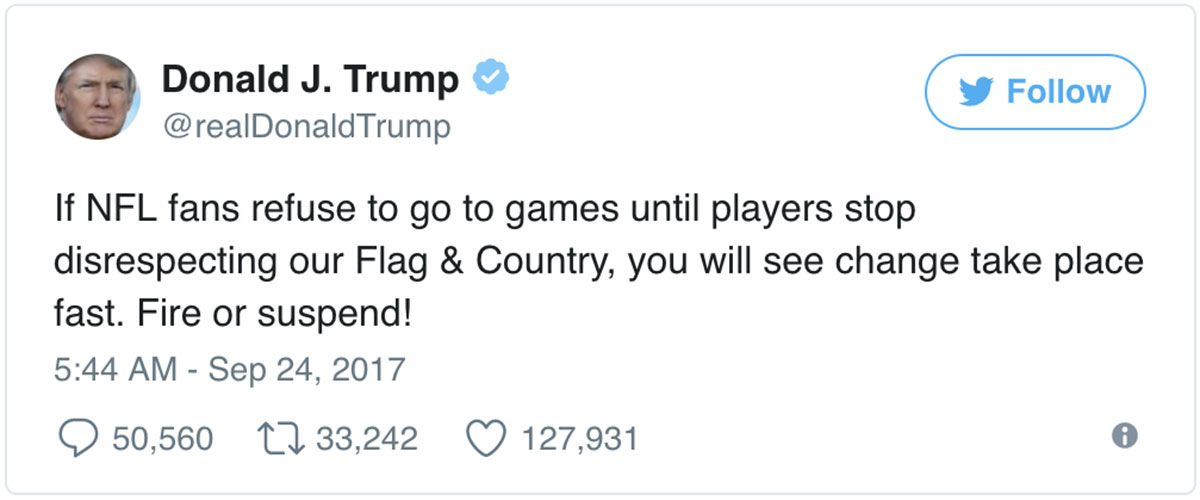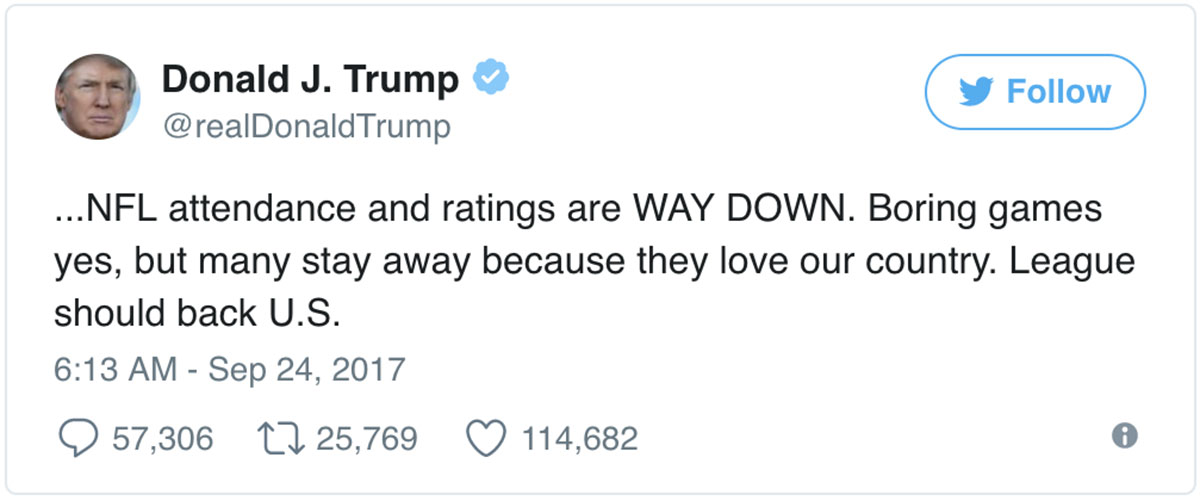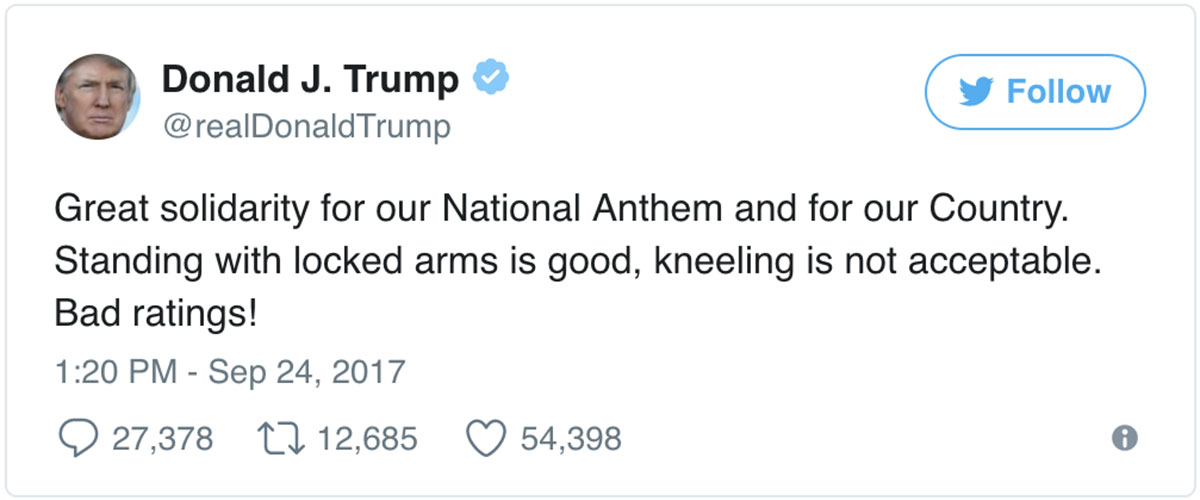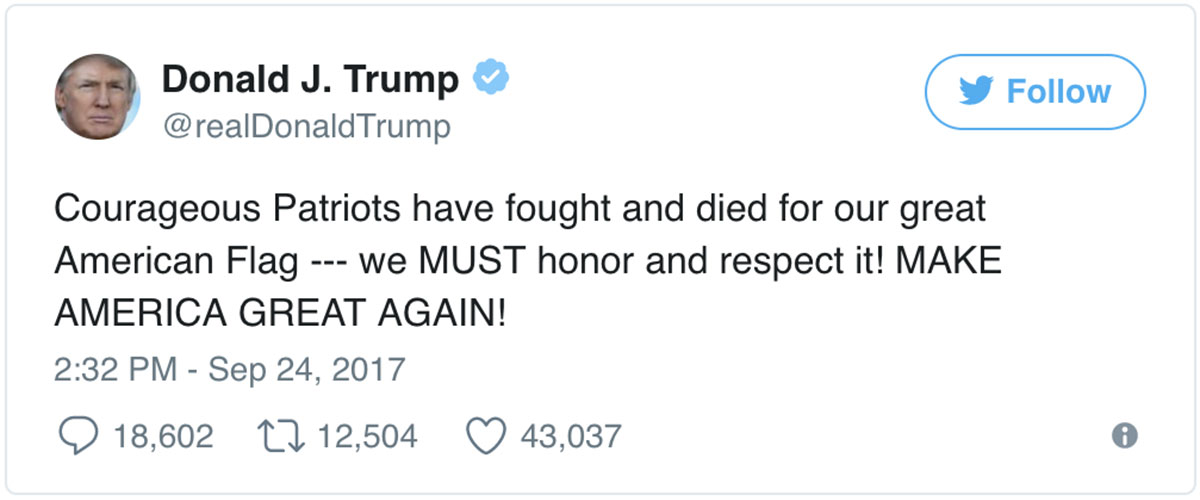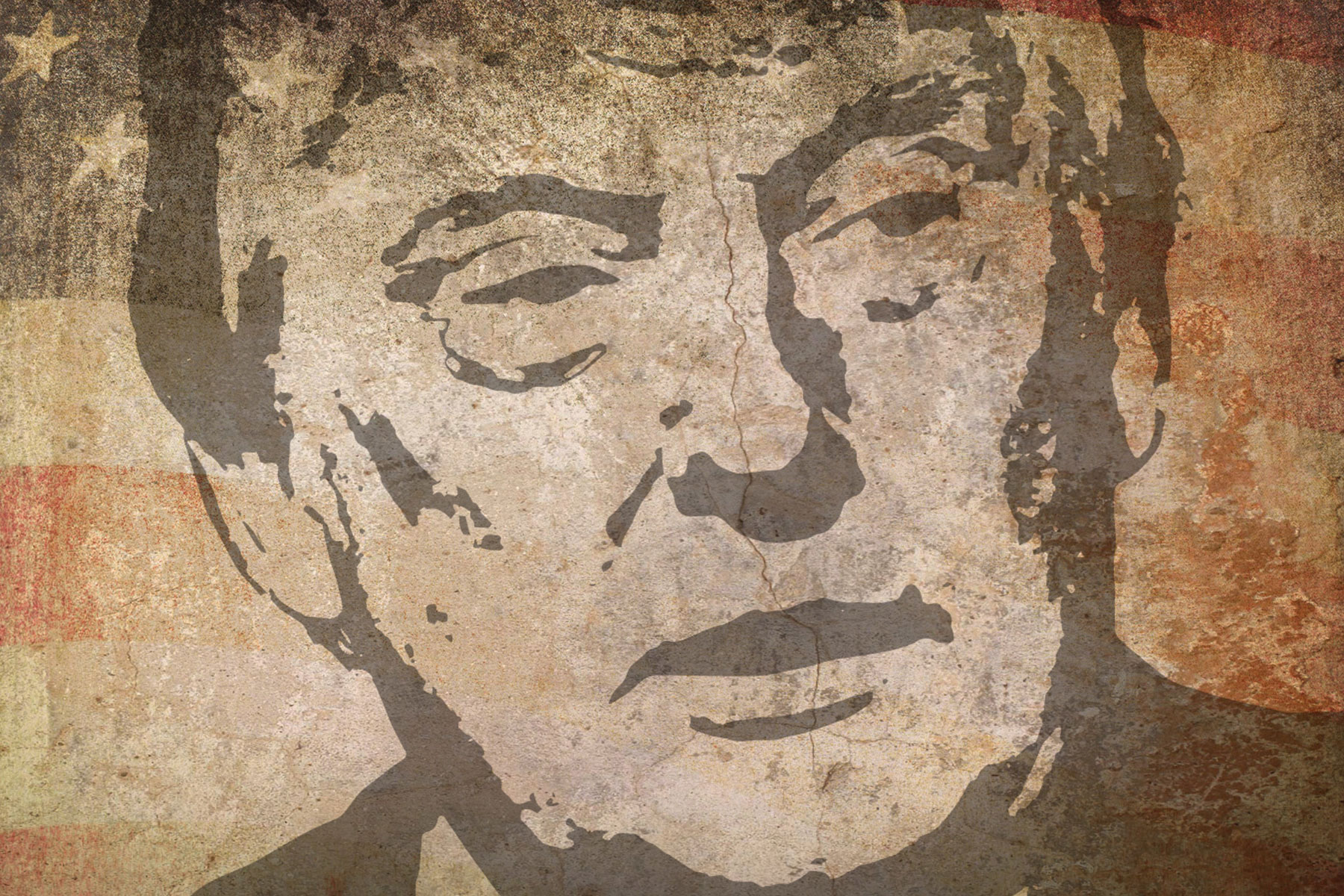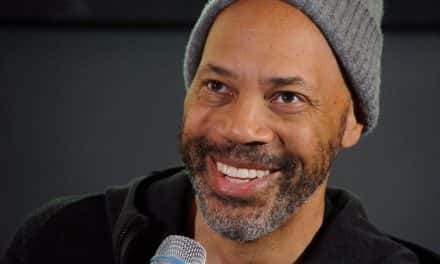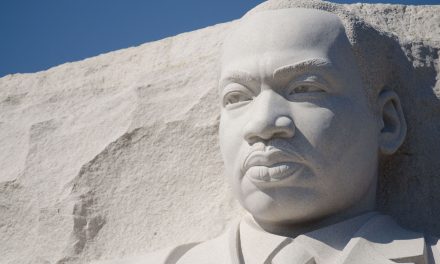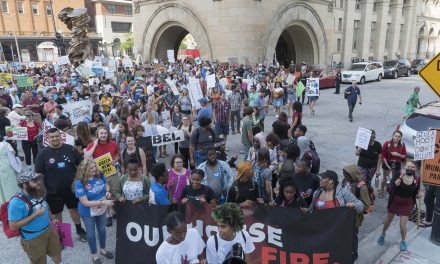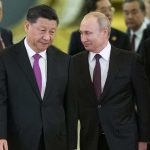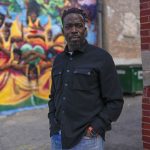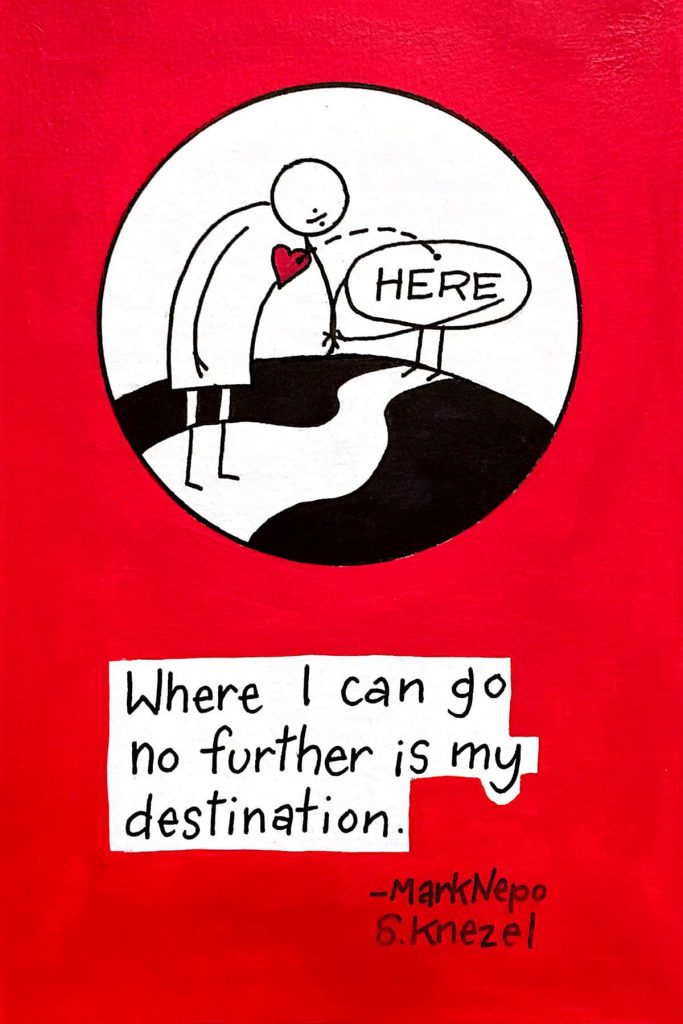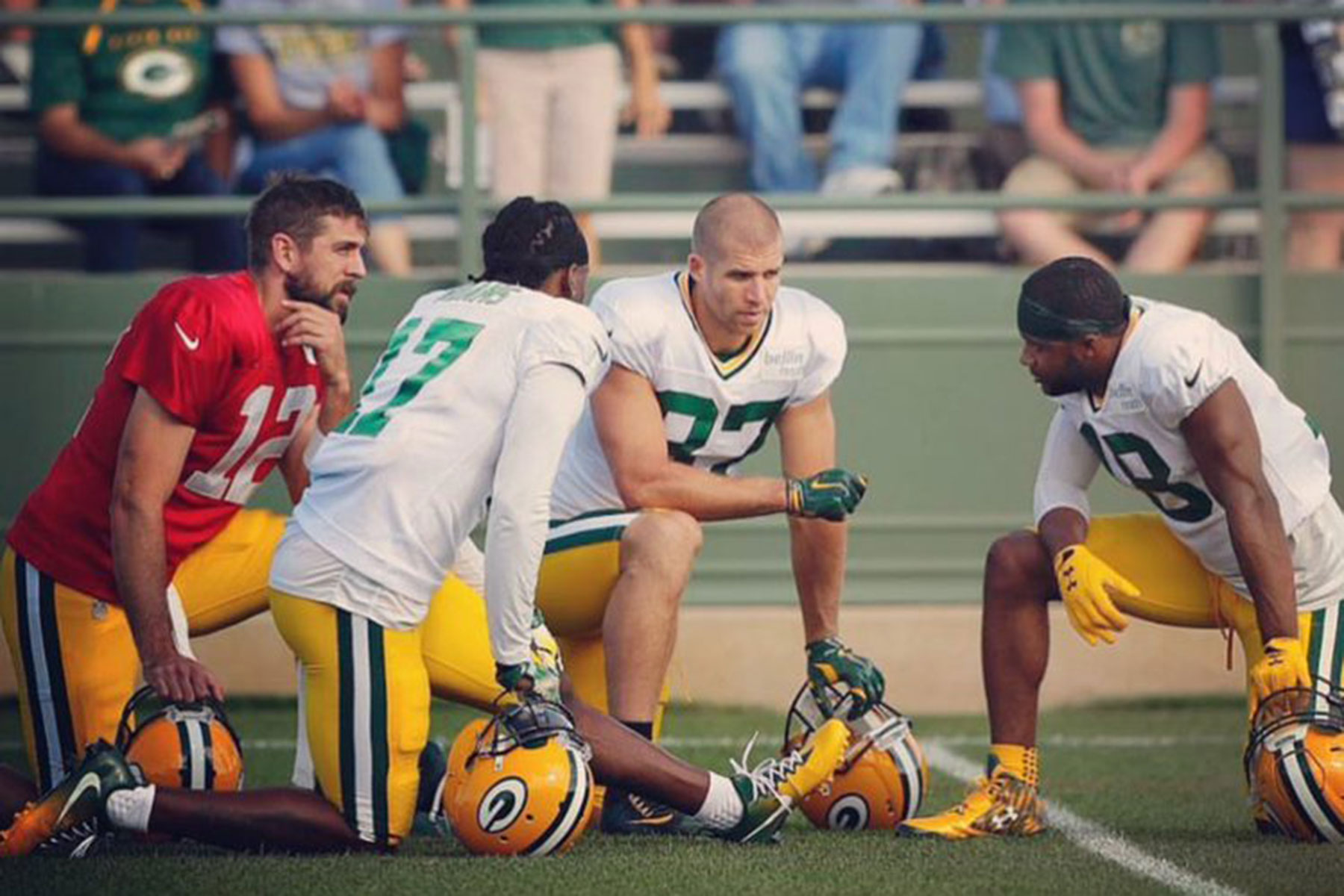
“Because that’s total disrespect of our heritage. That’s total disrespect of everything we stand for.” – Donald Trump, 45th U.S. President
After these words were spoken by the current U.S. president, the crowd at a Republican campaign rally in Huntsville, Alabama burst into cheers and began to chant USA! USA! USA! He was speaking about NFL players refusal to stand for the national anthem, following the example set by the former San Francisco 49ers quarterback Colin Kapernick last season.
He continued by saying, “Wouldn’t you love to see one of these NFL owners, when somebody disrespects our flag, to say, “Get that son of a bitch off the field right now’? He’s fired! He’s fired!”
This heritage he is speaking about, stretching back hundreds of years ago, is from a time when many whites felt that they were entitled to tell black people how they should feel, what they should say, and limited the things they could do.
It amazes me how often the ugly parts of America’s heritage are conveniently ignored as if they are unknown. Anyone who has paid even a small amount of attention in history class knows at least some of this history. People do not need to know much to understand the point Kapernick and others have made. The viral videos of unarmed blacks being kiIIed by pоlіcе over the past several years is evidence of this heritage that simply will not go away. People may disagree with how black people see these events, but they know deep down it is wrong what the President is trying to imply.
He has been rebuked by professional athletes of every major sports including NBA star Lebron James, members of the World Champion Golden State Warriors, some NFL owners, the NFL Players Association, and many others since making these remarks. He piled on later by repeating the remarks the next day on Twitter, and also rescinded an invitation to the Warriors team to visit the White House. Never mind the fact that it was pretty much decided already that they were not going anyway.
These outrageous statements were made just days after Hurricane Maria devastated Puerto Rico, and the US Virgin Islands. The message has become big news, despite the fact that the nation is on the verge of a possible war with North Korea. Texas, Florida, and Louisiana are all trying to recover from the horrors of Hurricanes Irma and Harvey.
Where are his priorities when Congress is hotly debating a bill, which may lead to the loss of health insurance for millions of Americans, including many who voted for him?
There are undoubtedly many Americans who support the President and his inflammatory remarks. It was only a few weeks ago that he refused to condemn racist white supremacist in Charlottesville. He even had the audacity to say that some of them were “good people.” He was heavily criticized for his handling of that situation and rightfully so.
In times like this it is instructive to put this situation into historical context.
Colin Kapernick started this modern firestorm when he stated, “I am not going to stand up to show pride in a flag for a country that oppresses black people and people of color. To me, this is bigger than football and it would be selfish on my part to look the other way.”
Many immediately accused him of being unpatriotic. He was basically told that he should shut up and play football. Instead, he continued to speak and act on his principles. As a result, NFL owners have refused to give him an opportunity to play this season, claiming he has not been blackballed. Anyone who knows anything about football, and the current NFL rosters of quarterbacks, can see that the arguments about Kapernick’s talent being the cause of not having a job are at best laughable, and in many ways tremendously disrespectful to the intelligence of fans and players.
Kapernick is not the first player of African descent to protest in a way that people considered being unpatriotic. The tradition of standing, and singing the Star Spangled Banner with a hand over the heart began with the 1918 baseball World Series. It would not be adopted as the official national anthem until 1931 after dozens of rejections by Congress to select it over more popular songs like America the Beautiful.
Olympic track stars John Carlos and Tommie Smith protested the anthem by walking shoeless with black socks to the podium, holding up a raised fist at the 1968 Mexico City Olympic games on October 16, 1968. They were roundly criticized, booted out of the Olympic village, and sent back home to the United States.
Smith wore a necklace of beads that he said, “were for those individuals that were lynched, or kiIIed, and that no one said a prayer for, that were hung and tarred. It was for those thrown off the side of the boats in the Middle Passage.”
The reaction to their gesture was swift. The athletes and their families received death threats by many “patriotic” Americans. Time magazine wrote: “‘Faster, Higher, Stronger’ is the motto of the Olympic Games. ‘Angrier, nastier, uglier’ better describes the scene in Mexico City last week.”
These courageous men and their Australian colleague Peter Norman had followed in the footsteps of the valiant Heavyweight Boxing Champion Muhammad Ali, who refused to be inducted into the U.S. military and fight in Vietnam.
His reasoning was clear, he said, “My conscience won’t let me go shoot my brother, or some darker people, or some poor hungry people in the mud for big powerful America. And shoot them for what? They never called me nigger, they never lynched me, they didn’t put no dogs on me, they didn’t rob me of my nationality, rape and kill my mother and father. Shoot them for what? How can I shoot them poor people? Just take me to jail.”
Smith, Carlos, and Kapernick later became Public Enemy Number One in the eyes of many white Americans, and simultaneously heroes to many black Americans just as Ali had done for speaking up. Former Heavyweight Champion Joe Louis, who had refused to speak or fight in front of segregated audiences, joined in the criticism of Ali by saying, “Cassius has made millions of dollars off of the American public, and now he’s not willing to show his appreciation to a country that’s giving him, in my view, a fantastic opportunity.” He simply voiced what many have said about Kapernick and other professional black athletes, that somehow making millions of dollars should preclude you from complaining about anything.
The criticism of these modern protesters aligns closely with that of prominent people who came down hard on Ali as well in 1967. The famous American television host David Susskind had this to say about Ali, “I find nothing amusing or interesting or tolerable about this man. He’s a disgrace to his country, his race, and what he laughingly describes as his profession. He is a convicted felon in the United States. He has been found guilty. He is out on bail. He will inevitably go to prison, as well he should. He is a simplistic fool and a pawn.”
Ali appealed his conviction and won. The tone of the remarks by Susskind is in tune with the stereotypical descriptions we have heard about Kapernick, as somehow being unintelligent due to his protest. There is a lack of basic understanding of the horrible mistreatment of blacks throughout the America’s history, which continues in a way that is apparently invisible to so many white people.
The first black man to be allowed to play in modern major league baseball, Jackie Robinson, was in many ways emblematic of the way black athletes have felt about the hypocrisy of the words “land of the free.” Those words were written in 1814, when more than 600,000 black people were in shackles. America was also pillaging Native American communities, kiIIing the young and old alike, to steal their land.
In 1972, Robinson reflected back to the time when he “integrated” baseball by saying, “I cannot stand and sing the anthem. I cannot salute the flag; I know that I am a black man in a white world.”
Most professional teams were not consistently integrated until the 1960s. The Boston Red Sox organization, notorious for its record of discrimination, passed on the opportunity to sign both future Hall of Famer Jackie Robinson and Willie Mays. The team finally capitulated by signing Jerry “Pumpsie” Green on July 21, 1959, becoming the last team to have a black player twelve years after Robinson integrated the Brooklyn Dodgers.
Malcolm X famously said, “Of all our studies, history is best qualified to reward our research. And when you see that you’ve got problems, all you have to do is examine the historic method used all over the world by others who have problems similar to yours.”
The racial problems we try to hide from are boiling to the surface regularly, because people of color refuse to stay silent. Many professional athletes are taking a stand, and showing that they will not be bullied into silence.
Dr. Martin Luther King Jr. wrote in his famous Letter From Birmingham Jail that, “I came across your recent statement calling my present activities “unwise and untimely. You deplore the demonstrations taking place in Birmingham. But your statement, I am sorry to say, fails to express a similar concern for the conditions that brought about the demonstrations. It is an historical fact that privileged groups seldom give up their privileges voluntarily. As Reinhold Niebuhr has reminded us, groups tend to be more immoral than individuals. We know through painful experience that freedom is never voluntarily given by the oppressor; it must be demanded by the oppressed. For years now I have heard the word ‘Wait!’ It rings in the ear of every Negro with piercing familiarity. This ‘Wait’ has almost always meant ‘Never.’ We must come to see, with one of our distinguished jurists, that ‘justice too long delayed is justice denied.’ I must confess that over the past few years I have been gravely disappointed with the white moderate. I have almost reached the regrettable conclusion that the Negro’s great stumbling block in his stride toward freedom is not the White Citizen’s Councilor or the Ku Klux Klanner, but the white moderate, who is more devoted to ‘order’ than to justice; who prefers a negative peace which is the absence of tension, to a positive peace which is the presence of justice; who constantly says: ‘I agree with you in the goal you seek, but I cannot agree with your methods of direct action;’ who paternalistically believes he can set the timetable for another man’s freedom; who lives by a mythical concept of time and who constantly advises the Negro to wait for a ‘more convenient season.’ Shallow understanding from people of good will is more frustrating than absolute misunderstanding from people of ill will. Lukewarm acceptance is much more bewildering than outright rejection.”
We continue to live in a country where the voices of the white moderates frustrate us. We constantly hear about the love of our Constitution, but consistently see that it only applies to some.
Supreme Court Justice Thurgood Marshall wrote that “The First Amendment means that government has no power to restrict expression because of its message, its ideas, its subject matter, or its content” in the Police Department of City of Chicago v. Mosley case in 1972. Forty-five years later, the President of the country and many others still cannot accept this simple concept.
Muhammad Ali once proudly warned Americans that, “I am America. I am the part you won’t recognize. But get used to me — black, confident, cocky; my name, not yours; my religion, not yours; my goals, my own. Get used to me.”
“It’s unfortunate that the President decided to use his immense platform to make divisive and offensive statements about our players and the NFL. We strongly believe that players are leaders in our communities and positive influences. They have achieved their positions through tremendous work and dedication and should be celebrated for their success and positive impact. We believe it is important to support any of our players who choose to peacefully express themselves with the hope of change for good. As Americans, we are fortunate to be able to speak openly and freely.” – Mark Murphy, Green Bay Packers President/CEO
© Photo
Aaron Rodgers
National Anthem Protest photo posted on Instagram by the Green Bay Packers quarterback, with the comment “#unity #brotherhood#family #dedication #love,” showing support of his teammates, and the rest of the players in the NFL.

